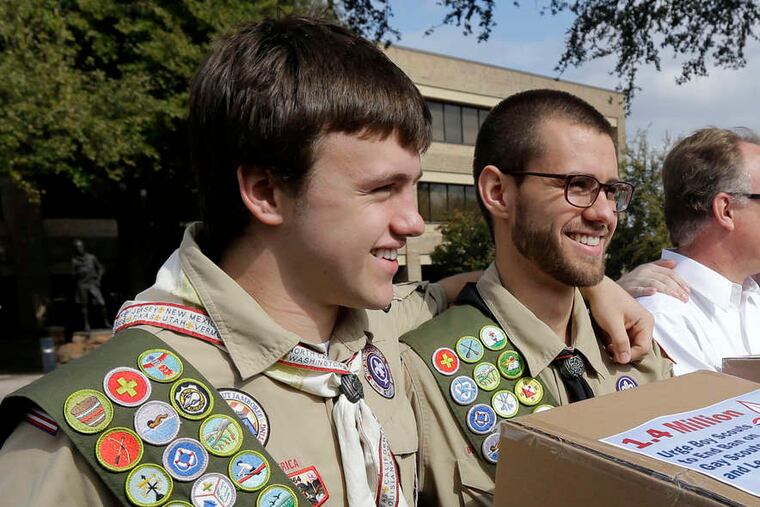Inquirer Editorial: Scouts honor history's march toward inclusion
Some 1,400 leaders of the Boy Scouts of America overcame a century of intolerance last week by voting to allow openly gay boys to join one of the nation's largest and most vibrant youth programs. Here's hoping an end to the organization's continuing discrimination against gay adults won't be far behind.

Some 1,400 leaders of the Boy Scouts of America overcame a century of intolerance last week by voting to allow openly gay boys to join one of the nation's largest and most vibrant youth programs. Here's hoping an end to the organization's continuing discrimination against gay adults won't be far behind.
This wasn't the first such proud step in the scouts' history. A year after the Boy Scouts of America's founding in 1910, the first black troop was formed, beginning the organization's long march toward interracial brotherhood at the height of Jim Crow.
Today, nearly half a century after the Stonewall riots marked the beginning of the gay-rights movement - at a time when many American institutions and companies actively recruit from the gay community - history has been outpacing the Boy Scouts. The organization's policy led to a long-running and only recently resolved dispute between a local chapter and the city of Philadelphia, which pushed to evict the scouts from city-owned property.
In contrast to the Boy Scouts, the Girl Scouts of America have for some time rejected discrimination and regarded sexual orientation as a "private matter." Many scouting organizations abroad, including those in Canada and Britain, openly admit gays as both scouts and leaders. And the U.S. military dropped its "don't ask, don't tell" policy in 2011 to accept openly gay service members.
It's fitting that the scouts are catching up. Scouting may be as American as Puritanism, but so are the contributions of gay Americans from Walt Whitman to Andy Warhol.
Religious convictions lie at the root of much opposition to gay rights, including the Boy Scouts' old policy. But Wayne Perry, the president of the Boy Scouts of America and a Mormon, expressed support for admitting openly gay scouts in a USA Today op-ed published just before last week's vote.
Even those who deem homosexuality morally wrong can heed St. Augustine's call to "love the sinner and hate the sin." After all, the Bible says Jesus broke bread with sexual outcasts. And Boy Scouts are in any case prohibited from engaging in sexual activity, heterosexual or homosexual.
Unfortunately, under the scouts' new policy, gay boys still face rejection by the organization once they turn 18. But this victory should encourage a continued fight for full inclusion.
One biographer has suggested that the very first scout leader, the British general Robert Stephenson Smyth Baden-Powell, was a closeted homosexual. Living as he did in the Victorian age, the founder of the international scouting movement would have wrestled with his sexuality all his life.
We should celebrate the chance to spare today's boys such anxiety. Perhaps they will become men in a less divided country.